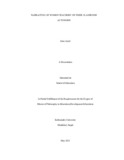
Please use this identifier to cite or link to this item:
https://hdl.handle.net/20.500.14301/346| Title: | Narratives of Women Teachers' on their Classroom Autonomy |
| Authors: | Aryal, Irina |
| Citation: | Aryal,I.(2023).Narratives of women teachers' on their classroom autonomy |
| Issue Date: | May-2023 |
| Publisher: | Kathmandu University School of Education |
| School: | SOED |
| Department: | DODE |
| Level: | M.Phil. |
| Program: | MPhil in Development Studies |
| Abstract: | The study explores the understanding on teacher autonomy, process of developing, practicing and updating autonomy of four women teacher teaching in secondary level from Kageshwori Manohara Municipality, Kathmandu. Teachers’ autonomy has always been shadowed in teachers' professional development which is also a key towards teachers' job satisfaction. There are countable studies on teacher autonomy in Nepal and limited researches focus on teacher autonomy but still women teachers' autonomy and the Nepali context of practicing their autonomy are unexplored yet. Thus, this research explores, analyzes and interprets stories of secondary level women teachers’ narratives of practicing their classroom autonomy. In addition, the study attempts to explore women teachers' experience of challenges and constraints while developing and practicing their classroom autonomy. While doing so, based on two research questions to be analyzed both in a different way the study has employed two different theories. Firstly, this study used feminist theory (Liberal Feminism) to discuss the first research question, how do secondary level women teachers' relate to the influence of socio- cultural environment on the development and practice of autonomy? Feminist theory is based on and applied to provide a critical lens in identifying the complexities and layers within the stories told by all four participants. Secondly, the study has also used Vygotskian theoretical framework on teachers' autonomy for addressing the second research question, how do they explain their stories of professional growth and promoting autonomy in classroom practices? The study reveals some important accounts of women experience of practicing, developing and updating autonomy. Furthermore, the analysis brings five reflective discussion in chapter four and five. This study raises issues for future research and has consequences for policy, educational institutions, instructors, and teacher training planners. Teacher require ongoing supervision, monitoring, and support from internal and external resources, as well as professional growth and training in these areas. School management committees should talk about ways to motivate students in the classroom, keep track of how lessons are taught, and plan breaks, workshops, and training sessions for teachers and students. Finally, this study is all about the story of four women teacher whose autonomy is guided by the underlying socio cultural values and the struggle they have gone through developing, practicing and updating it. |
| URI: | https://hdl.handle.net/20.500.14301/346 |
| Appears in Collections: | Dissertations |
Files in This Item:
| File | Description | Size | Format | |
|---|---|---|---|---|
| Irina Aryal Final Press Print Thesis 20800129.pdf | 1.2 MB | Adobe PDF |  View/Open |
Items in DSpace are protected by copyright, with all rights reserved, unless otherwise indicated.